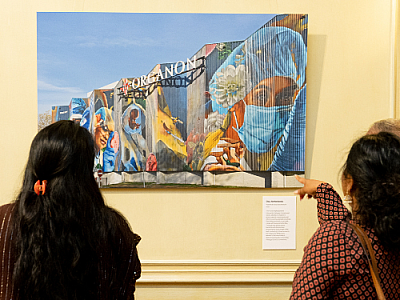Diplomacy Forum Captures Economic and Cultural Allure of Mainland Southeast Asia
The growing strategic importance of the Mekong region to the United States
Home to 242.8 million people from Cambodia, Thailand, Myanmar, Laos and Vietnam, the Mekong is rapidly becoming one of the most consequential regions for America’s future. The region has experienced significant economic growth, while attractive opportunities in energy and transportation infrastructure development have led to 1,039 U.S. companies operating in or with the five Mekong countries. As the United States strengthens its focus on the region through the Free and Open Indo-Pacific strategy (FOIP), America faces economic, security and governance challenges.
On June 6, 2019, Meridian brought together leaders from the diplomatic, government, business, policy and cultural communities for a comprehensive and holistic dialogue on the U.S. relationship with Mainland Southeast Asia. One of the largest gatherings ever held specifically on the Mekong region in Washington, D.C., the Meridian Diplomacy Forum: Countries of the Mekong featured 20 experts and speakers who explored U.S.-Mekong ties in terms of geopolitics, trade, investment, tourism and culture.

A large focus for the Forum was the economic and cultural allure of the region and its growing strategic importance to the United States. ASEAN, a regional intergovernmental organization of ten countries, represents a $2.4 trillion market – the fifth largest in the world. The five countries of the Mekong alone export $74.3 billion to the United States. However, there is strong concern that debt dependency, unsustainable agricultural practices, trafficking and erosion of governments threaten the region’s autonomy and resource security. This is all set against a backdrop of anxiety over China’s Belt and Road Initiative, which expands China’s sphere of influence throughout the region. Diplomacy Forum keynote speaker former U.S. Senator Jim Webb advised the U.S. to evolve its relationship with the region in the face of China’s expansionism. Webb cautioned that multilateral conversations were key to keeping China’s reach in check and counseled that the U.S. should bring China in to discuss trade and foreign policy issues and hold them accountable for what happens if they don’t comply. policy issues and hold them accountable for what happens if they don’t comply.
Some American scholars and residents of the Mekong worry about America’s role in Mainland Southeast Asia; however, there is a healthy appetite for U.S. engagement. FOIP marks a shift in overall U.S. international policy priorities to include the Mekong region and serves as a response to criticisms of America’s growing absence in these countries. During a panel focused on advancing U.S. relations with the countries of the Mekong, Vietnamese Ambassador H.E. Ha Kim Ngoc praised mechanisms for partnerships such as the Lower Mekong Initiative (LMI) and anti-trafficking projects that enable the United States to remain a supportive partner to the region. Although the types of relationships the U.S. maintains with the Mekong countries range from a long-standing friendship with Thailand to the recent but increasingly strong partnership with Vietnam, the engagement has enabled security cooperation and promoted a networked region.
The Lower Mekong Initiative: A decade of advancing U.S. relations along the Mekong
2019 marks the 10th anniversary for the Lower Mekong Initiative, which was created to enhance cooperation in the areas of environment, health, education and infrastructure development. During the Forum, Mark Clark, State Department Acting Deputy Assistant Secretary for East Asian and Pacific Affairs, shared insights from the LMI’s annual Policy Dialogue and Infrastructure Training on Energy workshop in May 2019. One emerging thread was an effort to work more closely with like-minded countries and allies such as Japan, Australia and the Republic of Korea.
The LMI and other U.S. efforts have built a strong history of stability, disaster relief efforts, female empowerment and sustainability in the Mekong. The LMI’s newest initiative to support water data access will enable the LMI to be a leading international governing body in the region. The U.S. Agency for International Development (USAID) bolsters STEM and human capital through COMET: Connecting the Mekong Through Education and Training. Nearly 70 percent of employers in the Mekong region are looking to hire, but only 16 percent say they can find recent graduates with the skills they need. USAID–LMI COMET prepares youth for employment by bridging the gap between educational institutions and employers. By 2019, COMET will help 12 post-secondary education institutions provide 80,000 youth with the workplace skills demanded by businesses in the Mekong.

Meridian has supported the LMI since its inception through implementing over 60 International Visitor Leadership Program (IVLP) exchanges as well as organizing the last four LMI Regional Working Group (RWG) meetings in Hanoi, Vietnam (2015), Phnom Penh, Cambodia (2016), Vientiane, Laos (2017) and Nay Pyi Taw, Myanmar (2018). The purpose of the RWG meetings is to engage 10-12 government officials from each of the five LMI countries in discussing issues and best practices related to the key pillars of the initiative, including education, environment, health, agriculture and connectivity.
Tapping into the trade and investment potential of the Mekong region
There is certainly anxiety over the current global trade landscape. Yet, as part of a panel addressing U.S.–Mekong relations, Randall Schriver, Assistant Secretary of Defense for Indo-Pacific Security Affairs, pointed to the Overseas Private Investment Corporation’s (OPIC) recently enacted BUILD Act and bilateral trade relations to signify that the United States remains one of the most open markets in the world. New efforts to support the region include AsiaEDGE, which concentrates on energy security and access, and ASEAN Smart Cities, a collaborative platform for member states to work towards the common goal of smart and sustainable urban development. Verinda Fike, South and South East Asia Regional Director for the U.S. Trade and Development Agency (USTDA), noted that she sees “a real hunger for quality partnerships and infrastructure projects” in the region. Fike emphasized the leadership role Vietnam is taking on these infrastructure projects and the general appeal for partnerships from stakeholders in the region.
While the United States is shifting to a whole of government approach to the region, the private sector also plays an essential role in the Mekong’s strength and future. The importance of the digital economy in this area cannot be overstated and the growth trajectory for the Mekong has the potential to become an economic powerhouse. During a panel focused on the economic attraction of the Mekong, Gen X Energy CEO Scott Kicker outlined the myriad opportunities for the private sector in the region. Kicker noted that while the private sector provides the best cost-effective methods, government is needed to support projects. Guarantees can help minimize risk, and market liberalization enables governments to spend money on social welfare projects. In turn, customers enjoy lower costs and higher quality products.

Myanmar is a case study on the untapped potential ripe throughout Mainland Southeast Asia. The internet first came to Myanmar in 2000. State-owned telecommunications provider Myanmar Post and Telecommunications (MPT) was the sole provider of services until the market opened up in 2013. Six providers now operate in the country and the number of internet users has risen from 2 million to more than 39 million. Myanmar expert and Inle Advisory Group founder Erin Murphy views this rapid growth as an opportunity because there are no issues of legacy present in older markets.
However, this growth is not without its challenges. Murphy explained that local mindsets still present an obstacle that U.S. companies will need to work through. There is a lack of trust in the banking system in Myanmar and the prevalence of cash hinders incentives for digital financial transactions. Strengthening digital and financial literacy will be an essential step for the country’s progress. The government also needs to provide a legal regulatory framework that protects but doesn’t stifle business ventures and has the capacity to get those frameworks in place. While these challenges may seem daunting, past successes can inform strategic decision making by policymakers and business leaders in the region.
Preserving culture, heritage and the environment through tourism and education
Tourism represents an essential industry for Mekong countries and an opportunity for cultural dialogue and understanding. Facilitating a panel on this theme, the Stimson Center’s Brian Eyler explained, “Tourism is a way we can learn about culture and also ecology.” Cultural diplomacy enables cross-cultural understanding and strengthens relationships by bringing people together through shared interests and values. Through the lens of tourism, cultural diplomacy can preserve cultural heritage and protect natural resources. Ecotourism can provide a way for outside people to learn about the local culture and for the local people to preserve their heritage and ecology. Cornell University Associate Professor Dr. Shorna Allred cited research showing how culture plays a very big role in resilience. When aspects of the land are tied to the well-being of the people, there are many positive downstream effects. One example is how traditional ecological knowledge can be coupled with science at the local level to create better informed decision-making.

In a fireside chat examining the diaspora and cultural bridge of U.S.–Mainland Southeast Asia ties, Legacies of War Executive Director Channapha Khamvongsa and Lao Heritage Foundation President Niphasone Souphom, offered insight into the evolving relationship of these communities. Nonprofits like theirs focus on cultural engagement and education as a path to preservation of heritage. Serving as cultural ambassadors, these organizations can enter spaces that may previously have been closed off. Their mission is to engage teachers and to provide a curriculum that protects teachers’ independence and prioritizes cultural values.
There has been a small revolution in the diaspora community. For a long time, stories of the past were often suppressed or silenced, but now there is a desire for the diaspora to return to their home countries and to explore the past. Through Facebook, individuals can share their experiences of going back to their native countries to see their parents’ history. Food has been a major catalyst for the diaspora community to visit their home countries. Chefs want to see the roots of their culinary heritage and to bring that knowledge back with them into their kitchens. Overall, there is a growing eagerness for the diaspora community to contribute in some way and uncover ways to engage.
Positioning culture alongside trade and politics in diplomacy
Meridian actively engages in cultural diplomacy to strengthen bilateral relationships with the countries of the Mekong. In 2018, Meridian celebrated 200 years of relations with Thailand through an exhibition at the Queen Sirikit Museum of Textiles displaying the official gifts exchanged between the two nations at significant moments over the past 200 years. The exhibition, Great and Good Friends, was the marquee event to celebrate the bicentennial of U.S.–Thai relations and Meridian’s largest and most extensive cultural diplomacy endeavor to date. Additionally, in partnership with the State Department and University of North Carolina at Chapel Hill, Meridian administers Next Level, a hip hop diplomacy initiative that promotes conflict transformation, entrepreneurship, and artistic and professional development among younger and under-served audiences around the world. In the past three years, Next Level has completed residencies in Cambodia, Myanmar and Thailand.

Meridian believes that culture is a strong way to establish ties. Therefore, it was important for the Diplomacy Forum to include aspects of culture alongside the conversations on politics and business. After an afternoon of panel discussions, fireside chats, and featured speakers, guests were invited to a cultural celebration of the Mekong countries. They were treated to visual art, dance, cuisine and fashion of the region. Dancers showcased traditional dance and dress from Cambodia, Myanmar and Thailand. Thai performers entertained guests with musical acts including the ranad ek (wooden xylophone), kong wong wai (big round gongs), saw u (two stringed fiddle) and ching (cymbals). A photo exhibition displayed photos from the Great and Good Friends exhibit as well as photos from the Embassy of Myanmar. Attendees observed the magical work of a Thai fruit carver, while savoring the region’s traditional cuisine and sipping a Beerlao, a popular beer produced by the Lao Brewery Company of Vientiane.
The Diplomacy Forum brings together government and cultural leaders with economic experts and the business community to examine the role of soft power in international relations. It explores a country or region’s cultures and how they can pave the way for increased engagement and economic opportunities with the United States. Given Mainland Southeast Asia’s growing geopolitical importance – yet continued lack of attention by U.S. media and the policy community – Meridian was proud to highlight the vibrancy of the countries along the Mekong and we hope this serves as a catalyst to a greater U.S. focus on the region.
see more photos learn moreThe Meridian Diplomacy Forum: Countries of the Mekong was supported through the generous contributions of Chevron, Gen X Energy, United Airlines and Banpu.


